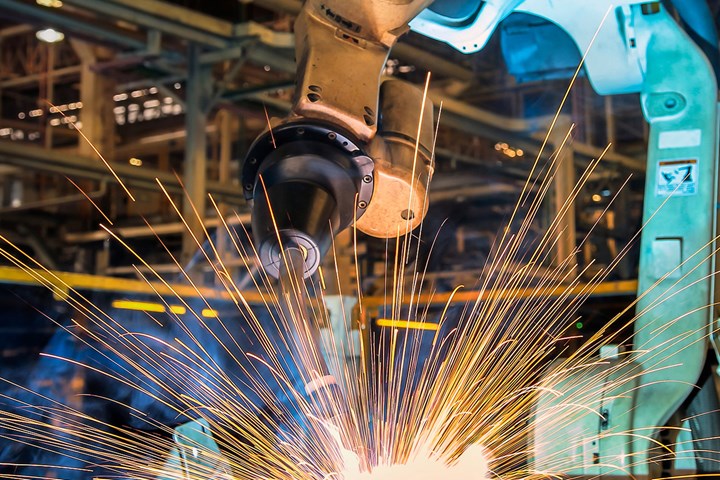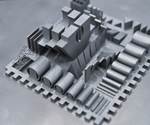ESPRIT, Alma CAM Partner for Robot Additive DED Programming
The collaboration brings together additive toolpath planning in both subtractive and additive areas, and robots retrofitted for DED applications for a complete programming solution.

Photo Credit: ESPRIT
ESPRIT (by D.P. Technology, Camarillo, California), CAM software for CNC programming, optimization and simulation, announced on Nov. 16 a partnership with Alma CAM (Saint-Martin-d'Hères, France), a CAD/CAM provider for robotics, to create a complete programming solution for robot additive direct energy deposition (DED, see “How to Select the Right Programming CAM Software for Directed Energy Deposition in Mold Repair and Modification”).
Additive DED is a series of metal 3D printing technologies that creates parts by melting and fusing material as it is deposited. Wire arc additive manufacturing (WAAM), also known as DED-arc, is one of the additive DED technologies being applied in robot additive DED to produce the near-net shape preforms with significant cost and lead time reductions, increased material efficiency and improved component performance.
Additionally, says ESPRIT, many companies have existing programmable, industrial robots that can be retrofitted for additive DED applications. However, in order to program a robot to perform an additive DED task, an engineer needs to determine not only the toolpath of the DED head, but also the robot arm movements to efficiently achieve the ideal toolpath (here is a video on a robot additive DED workflow).
To provide customers with an end-to-end solution for programming robot additive DED, ESPRIT reports that it has been working with Alma to bring the best of the two worlds together—the world’s most advanced toolpath planning in both subtractive and additive areas, and technology in robotics trajectory computation and off-line programming of arc welding robots.
This solution is said to allow Alma to use the full ESPRIT additive DED cycles such as 3x, 4x, and 5x, bringing the software to what ESPRIT claims is a new level of support for additive technology. Further, the solution enables ESPRIT to support industrial robot brands including Yaskawa, ABB, FANUC, Kuka, and others.
The result of this technology partnership is a complete workflow to provide end users with:
- Dedicated additive toolpath planning and programming
- Robot programming, simulation, verification, collision detection and code generation
- Subtractive finishing process planning, simulation, verification, collision detection and G-code generation
Through industry collaboration with several key customers and research institutions, the solution between ESPRIT and Alma has been reportedly validated in multiple applications and test cuts with various robot brands.
ESPRIT will also be presenting an additive webinar to learn about the first commercial version of ESPRIT’s new additive DED (direct energy deposition) feature on Dec. 10, 2020.
Related Content
-
Large Hybrid Steel Insert Solves Deformation, Dimensionality, Cycle Time Problems
DMLS printers using metal additive powders selected by Linear AMS to produce high-quality, accurate, consistent 3D-printed mold components with certification and traceability.
-
Building Molds: Most Popular Reads of 2024
Dive into the most-viewed content for building your mold, including topics such as cutting tools, EDM, hot runners, additive manufacturing, mold materials, machining and mold components.
-
The Benefits of Vertically Integrating Metal 3D Printing and Machining
Having 3D printing and machining within one organization enables Addman’s engineers to collaborate and consolidate so it can quickly make successful metal 3D-printed parts.















